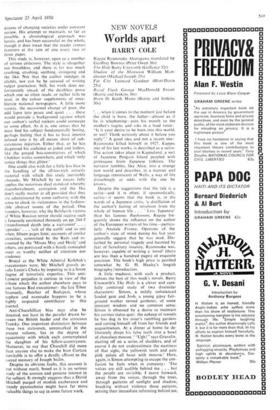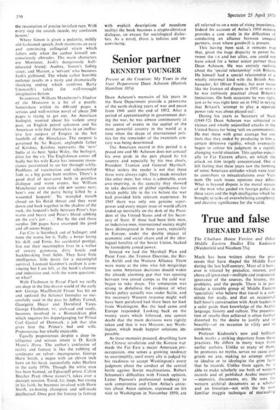NEW NOVELS
Worlds apart
BARRY COLE
Kappa Ryunosuke Akutagawa translated by Geoffrey Bownas (Peter Owen 36s) The Hide Barry Unsworth (Gollancz 32s) Shadow of the Monsoon William Man- chester (Michael Joseph 35s) Fat City Leonard Gardner (Hart-Davis 25s) Royal Flash George MacDonald Fraser (Barrie and Jenkins 30s) Horn D. Keith Mano (Barrie and Jenkins 30s) 4... when it comes to the moment just before the child is born, the father—almost as if he is telephoning—puts his mouth to the mother's vagina and asks in a loud voice: "Is it your desire to be born into this world, or not? Think seriously about it before you
reply"." A good idea and not a recent one:
Ryunosuke killed himself in 1927. Kappa, one of his last works, is described as a satire.
The action takes place in Kappaland, a sort of Japanese Penguin Island peopled with grotesques from Japanese folklore. The narrator tumbles, like Alice, into a strange new world and describes, in a manner and language reminiscent of Wells, a way of life disturbingly at odds with the one he knows.
Despite the suggestions that the tale is a satire—and it is often, if spasmodically, satiric—it seems that the book is, in the words of a Japanese critic, 'a distillation of the author's feeling of revulsion from the whole of human life . . . ' Less 'Japanese'
than his famous Rashomon, Kappa fre- quently shows the influence on the author
of the European writers of his time—particu- larly Anatole France. Opinions of the author's state of mind during his last year generally suggest that he was mad. Dis- turbed by personal tragedy and haunted by fear of hereditary insanity, Ryunosuke was, however, capable of writing a 'novel' (there are less than a hundred pages) of exquisite precision. The book's high price is justified somewhat by G. H. Healey's longish biography/ introduction.
A little madness, with such a product, imbues the best of this week's novels. Barry Unsworth's The Hide is a clever and care- fully contrived study of two dissimilar characters: Simon, a mildly unbalanced
landed gent and Josh, a young gipsy fair- ground worker turned gardener, of some innocent wisdom and no common sense.
Simon is obsessed by a desire to maintain his curious status quo: the upkeep of tunnels he has dug in his sister's rambling gardens and cutting himself off from her friends and acquaintances. At a dinner at home he de- liberately drops his false teeth into a bowl of chocolate mousse. "Ugh!" says Gravelin,
starting off on a series of shudders, and of course I do not underestimate the nastiness
of that sight, the yellowish teeth and pale pink palate all beset with mousse.' Here, again, is Simon attempting to escape the con- fusion he feels when in company: 'The voices are still audible behind me . . . but the people are invisible. I move forward, away from the voices, through the trees, through patterns of sunlight and shadow, breaking without violence these patterns, sensing their immediate reforming behind me,
the resumption of precise inviolate rays. With every step the sounds recede, my confusion lessens.'
Where Simon is given a pedantic, mildly old-fashioned speech, Josh maintains an easy and convincing colloquial strain which falters only when the author himself un- consciously obtrudes. The main characters are Mortimer, Josh's dangerously half- educated friend; Audrey, Simon's fading sister; and Marion. a 'servant' who becomes Josh's girlfriend. The whole rather horrible melange results in a nasty and dramatically shocking ending which confirms Barry Unsworth's talent for well-wrought imaginative fiction.
In contrast, William Manchester's Shadow of the Monsoon is a bit of a puzzle. Somewhere within its 400-odd pages a serious and well-written novel of about 200 pages is trying to get out. An American biologist, worried about his violent army past, an English petrol salesman and his American wife find themselves in an ineffec- tive last outpost of Empire in the hot foothills of the Himalayas. The outpost is governed by Sir Rajani, anglophile father of Krishna. Krishna represents the 'new' India at its best; Spike Wiley, the biologist, ditto for the us. The Englishman comes off badly but his wife Katie has innocent insou- ciance guaranteed to see her through safely. Problems of vaccination and salesmanship fade as a big game hunt misfires. There's a good deal of near-corn both in pointless dialogue and worn events, but William Manchester can make old BOP scenes new; here's one of the party being killed by a wounded leopard: 'Its mangled mouth closed on his florid throat and they went down and back together in the shadow of the rock, the leopard's belly between Peter's legs warm and heavy and Peter's blood sobbing on the cat's jaw . . .' But by the end those surplus 200 pages have swamped the good and all seems boggy.
Fat City is Steinbeck out of Salinger; and none the worse for it. Tully, a boxer losing his skill, and Ernie, his accidental protégé, live out their meaningless lives in a welter of sweaty gymnasia, dirty hotels and backbreaking fruit fields. They have little intelligence, little desire for a meaningful survival. Leonard Gardner's realism is con- vincing but I am left, at the book's clammy and indecisive end, with the worn question: so what?
With Flashman in Royal Flash we really are deep in the line-drawn world of the early BOP. George MacDonald Fraser has hit on
and updated the fictional formulas so suc- cessfully used in the past by Jeffrey Farnol, Georgette Heyer and Dornford Yates.
George Flashman, vc, arch-cad and toady, becomes involved in a Bismarckian plot which requires his doppelganging for Prince Carl Gustaf of Denmark, a job that also gives him the Prince's bed and wife. Preposterous but wholly enjoyable.
Equally preposterous despite a deep in- telligence and serious intent is D. Keith Mano's Horn. The author's confusion of reality and fantasy is like the rubbing of
sandpaper on velvet—incongruous. George Horn Smith, a negro with an eleven inch horn on his head, successfully rules Harlem in the early 1970s. Though the white man has been banned, an Episcoptl priest, Calvin Beecher Pratt (those names!), takes over a decrepit mission. Timid, fat, inept, but strong in his faith, he becomes involved with Horn Smith, ex-boxing champion and self-made intellectual. Once past the fantasy (a fantasy
with explicit descriptions of mundane reality) the book becomes a crypto-christian dialogue, an excuse for sociological dialec- tics. As a novel, Horn is tedious and un- convincing.







































 Previous page
Previous page